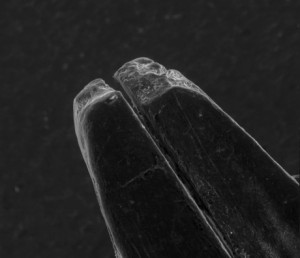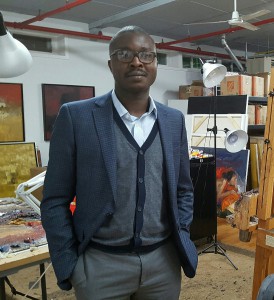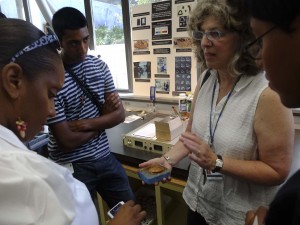Workshop I: A WORKSHOP ON MATERIALITY
Instructor: Nina Liebenberg
June 6 – 10, daily from 09:00 – 16:00
Old Medical School Building, Hiddingh Campus
![]()
This workshop aims to introduce recent thinking and writing about objects – and to create a forum for experimental activations of this scholarship. Since the dedicated study of objects does not reside neatly within a single discipline, we will explore a suite of different approaches to material culture. Speakers from various academic fields ranging from art history, science, classical studies, digital media, design history, feminism, film and television studies, history, philosophy, psychoanalysis, religious studies and visual culture will share their insights during the morning sessions. In the afternoons, students will convert theory into practice with a range of practical exercises – all of which will hopefully allow us to heed Wordsworth’s bold injunction to “see into the life of things.”
>Image, top right: Cornelia Parker, Brontëan Abstract (Charlotte Brontë’s quill pen), 2006, Courtesy the artist & Frith Street Gallery, London
Workshop II: PREVENTIVE CONSERVATION
Instructors: Angela Zehnder, conservator & Hayden Proud, curator
Iziko South African National Gallery
July 4 – 8 (hours to be advised)
![]()
The care and preservation of art collections will be introduced within different contexts and will include a range of environments. The materials and techniques of artists will also be considered within this context. This workshop will include work with specialists and artist presentations. There will also be a practical hands-on component, including work with the low
magnification stereomicroscope that allows for the study of artworks in greater detail
Workshop III: CURATING THE MOMENT: THE OBJECT AND ITS ECOSYSTEM
Instructor: Ugochukwu-Smooth C. Nzwei
Centre for Curating the Archive
August 15 – 20 (hours to be advised)
![]()
Ugochukwu-Smooth C. Nzewi is an artist, art historian, and curator of African art at the Hood Museum of Art, Dartmouth College, Hanover, New Hampshire. He holds a Bachelor of Arts degree in fine and applied arts from the University of Nigeria, Nsukka, Nigeria; a postgraduate diploma in museum and heritage studies from the University of Western Cape, South Africa; and a Ph.D. in art history from Emory University. Nzewi has participated in international artists’ residency and workshop programs and more than 35 art exhibitions in Africa, Europe and the United States. He has curated exhibitions in Africa and the United States, including the Afrika Heritage Biennial in Nigeria in 2007; “Transitions: Contemporary South African Works on Paper” at Atlanta’s High Museum in 2009; Dak’Art Biennial in 2014, and “Guess Who’s Coming to Dinner” at Richard Taittinger Gallery in New York in 2015. Nzewi has lectured widely in major academic institutions and museums and participated in symposiums and biennale platforms in the United States, Latin America, Africa, the Middle East, and Europe. His recent publication is
New Spaces for Negotiating Art (and) Histories in Africa (2015), a book on independent art initiatives in Africa, co-edited with Kerstin Pinther and Berit Fischer. As a practicing artist, Nzewi has exhibited internationally and participated in a number of artists’ residencies and workshops including the Greatmore Studio (Woodstock, Cape Town) and Vermont Studio (Johnson, Vermont, USA) residencies. His work is in both public and private collections including the Smithsonian National Museum of African Art in Washington, D.C., and the Newark Museum in New Jersey. He is a recipient of several academic fellowships, scholarships, and artists’ awards such as the TIAA-CREF Ruth Simms Hamilton Fellowship, Smithsonian Institution Fellowship, and Robert Sterling Clark Foundation Fellowship.
Workshop IV: THE HISTORY AND CURRENT PRACTICES OF PREVENTIVE CONSERVATION
![]()
Instructor: Ellen Pearlstein, Associate Professor, Conservation, UCLA/Getty Program in the Conservation of Archaeological and Ethnographic Materials, University of California, Los Angeles
Convenor: Angela Zehnder
August 22 – 26, 2016 (hours to be advised)
Iziko South African National Gallery
![]()
Ellen Pearlstein earned her M.A. in art history and archaeology at Columbia University, NYC in 1978, where she studied pre-Columbian and African material culture. She eared her Advanced Certificate in Conservation at the Conservation Center at the Institute of Fine Arts, New York University in 1982, with an emphasis on materials deriving from archaeological and ethnographic contexts. Ellen was awarded the first Fröhlich Fellowship in Objects Conservation at the Metropolitan Museum of Art in 1982, where she studied surfaces on African wood sculpture. From 1983-2005, Ellen was an objects conservator at the Brooklyn Museum in New York. In 2005, Ellen moved to Los Angeles to assume a faculty position in the UCLA/Getty Program in the Conservation of Archaeological and Ethnographic Material. As a member of the founding faculty, Ellen and her colleagues designed curriculum, outfitted a conservation laboratory, and Ellen designed and began teaching graduate classes in the conservation of organic materials, ethics of working with indigenous communities, and preventive conservation and managing collections. In 2008, Ellen joined the UCLA Depart of Information Studies, and she invited students interested in library and archive materials into her preservation and management classes. Ellen’s research includes the effects of environmental agents on ethnographic and natural history materials; use of cochineal lake pigments on pre- and post-Hispanic qeros from the Andes; and curriculum development within conservation education. Ellen is a Fellow in the American Institute for Conservation, winner of the Keck award, and is Vice President of the Association of North American Gradate Programs in Conservation.




